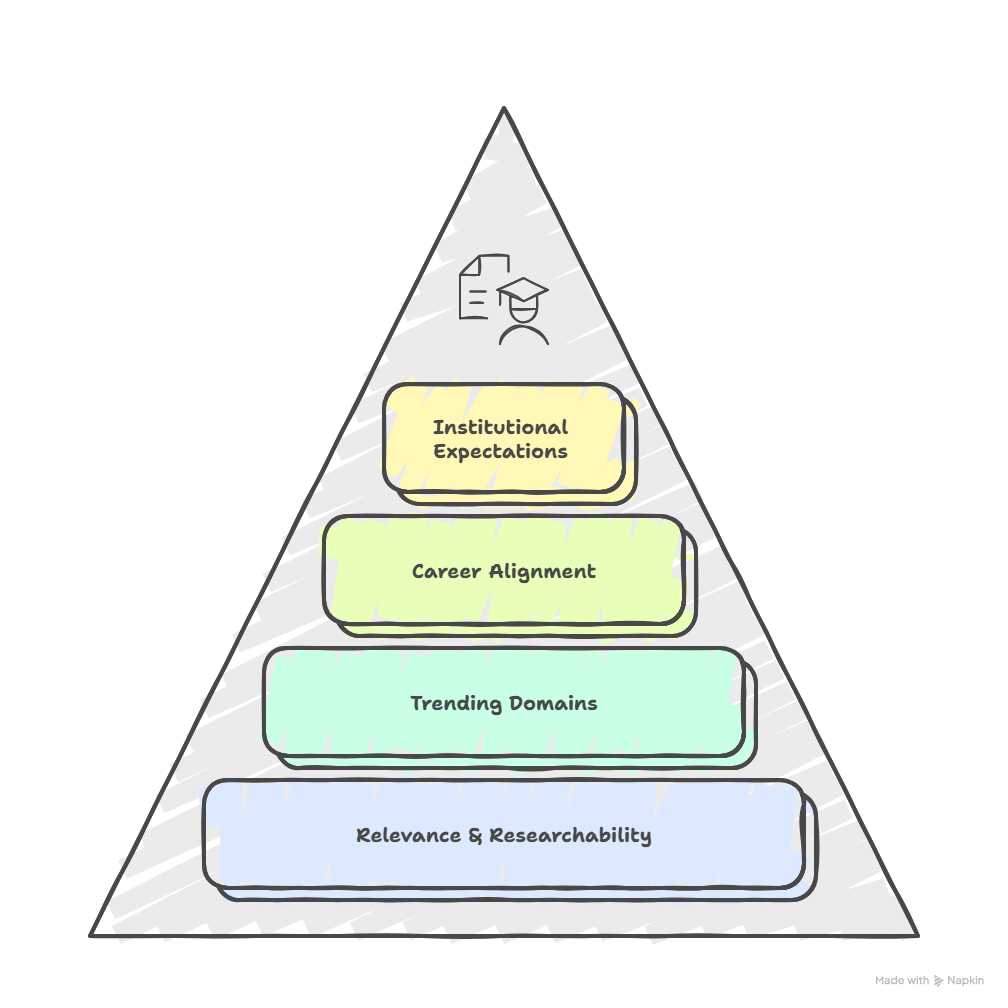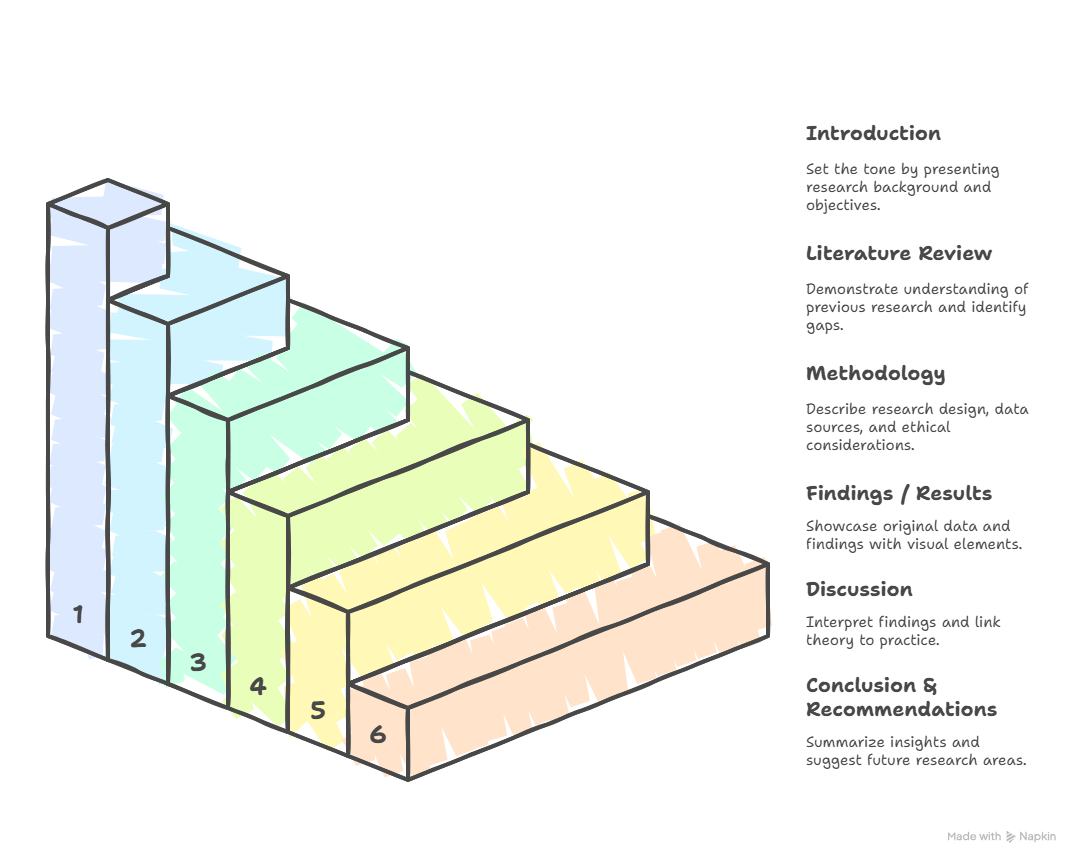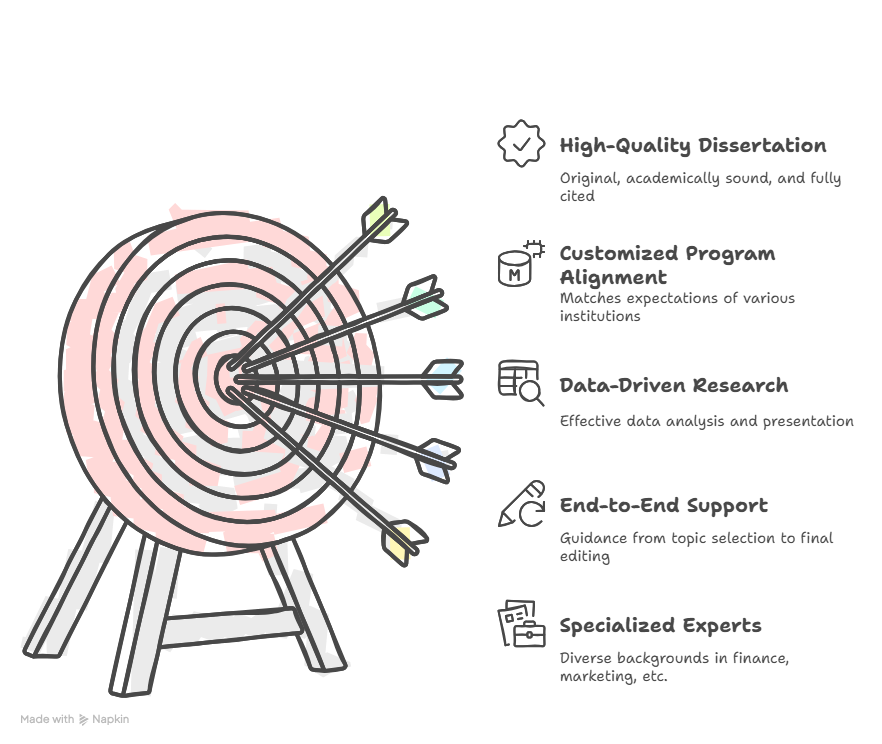For MBA students, a business dissertation is more than just an academic requirement—it’s a powerful tool that bridges the gap between theory and real-world practice. Whether you aim to work in consulting, finance, marketing, or entrepreneurship, your dissertation can showcase your ability to analyze problems, apply business frameworks, and propose strategic solutions.
A well-researched dissertation reflects your understanding of business environments and your capability to solve industry-specific challenges. This becomes particularly valuable when entering competitive roles where employers seek practical knowledge backed by solid research. In fact, many top recruiters now view the business dissertation as a portfolio piece that highlights a candidate’s problem-solving mindset and analytical skills.
Moreover, for working professionals pursuing an executive MBA, a compelling dissertation can lead to promotions or internal transitions, especially when the research addresses issues within their own organization. When your dissertation topic reflects your career ambitions, it becomes a strategic tool that propels your professional development and long-term success.
In today’s results-driven business world, business dissertation writing is your opportunity to stand out—not just academically, but professionally. With the right guidance and strategic focus, it can become your most impactful academic achievement.
Table of Contents
Choosing the Right Topic for Your Business Dissertation
Choosing an appropriate topic is a foundational step that greatly influences the success of your business dissertation writing journey. A strong topic lays the foundation for a compelling and relevant study. Here’s how to get it right:
- Focus on Relevance and Researchability
Choose a topic that addresses a real-world business issue and has enough scope for research.. Ask yourself: Can I find enough data? Does this solve a current business problem? - Explore Trending Domains
In 2025, high-demand dissertation areas include digital marketing, financial risk analysis, human capital management, and strategic innovation. These topics align well with global business trends and attract academic interest. - Align with Career Goals
Your dissertation should reflect the field you wish to enter after graduation. For example, if you’re targeting a role in HR, explore topics like employee engagement, remote workforce management, or HR analytics. - Match Institutional Expectations
Review your university’s dissertation guidelines to ensure your topic meets academic standards. Consult your supervisor to confirm its feasibility.
Choosing the right topic ensures your business dissertation writing journey is not only successful but also meaningful for your future career.
Crafting a Strong Dissertation Proposal
Before you dive into full-scale business dissertation writing, crafting a well-structured proposal is essential. This proposal acts as a blueprint for your research and must clearly communicate your study’s relevance, direction, and feasibility. Here’s how to build it effectively, step by step:
1. Define Clear Objectives
Begin by clearly defining the goals of your research. Are you investigating how digital marketing affects brand loyalty, or examining risk management approaches within fintech companies? Your objectives must be precise, actionable, and closely aligned with your chosen dissertation topic. They serve as the foundation of your study and help maintain a focused direction throughout your research.
2. Frame a Strong Problem Statement
Every business dissertation addresses a problem. Clearly articulate the gap your study will fill. For example: “Despite the growing adoption of remote work, there is limited understanding of its long-term impact on employee productivity.” This section tells your readers (and your supervisor) why your research matters.
3. Develop a Hypothesis (if applicable)
If your research includes quantifiable elements, it’s important to develop a hypothesis that can be tested through data and analysis. For example: “Increased investment in employee wellness programs leads to higher retention rates.” A well-thought-out hypothesis shows that your research is grounded in logic and aimed at testing assumptions.
4. Conduct a Brief Literature Review
A good proposal highlights the current research landscape. Summarize key studies, identify gaps, and position your topic within this context. This proves you’ve done your homework and aren’t duplicating existing work. The literature review builds your credibility and informs your research direction.
5. Outline the Methodology
Explain how you will carry out the research—what data you’ll collect, from where, and using what tools. Mention whether your study is qualitative, quantitative, or mixed-method. Include details about surveys, interviews, or financial data analysis, especially common in business dissertation writing.
6. Seek Supervisor Approval
Once your proposal is ready, review it with your academic advisor or dissertation committee. Be open to feedback and revise accordingly. A proposal that aligns with university expectations and is clearly structured is more likely to be approved without major changes.
A compelling proposal not only earns approval but sets a strong foundation for successful business dissertation writing. Taking the time to craft it thoughtfully will save you time and confusion later in the process.
Structuring Your Business Dissertation: Chapter-Wise Breakdown
A well-organized structure is the backbone of effective business dissertation writing. Each chapter must serve a purpose and flow logically into the next. This helps readers understand your research journey clearly and ensures academic acceptance. Here’s how to structure your business dissertation writing in a way that’s both impactful and institutionally appropriate.
Introduction
The opening chapter sets the tone for your dissertation. Begin by presenting your research background, outlining the problem, and stating the main objectives. Provide a rationale for your study and explain its relevance in the real-world business context. The introduction should clearly state your research questions and offer a brief overview of the methodology you plan to use.
Literature Review
This chapter demonstrates your understanding of previous research in your chosen field. Summarize key studies, highlight theoretical frameworks, and identify research gaps your study intends to address. For MBA students, it’s important to relate theory to current industry practices. A strong literature review shows depth of research and positions your work within the academic conversation.
Methodology
In this chapter, describe how you conducted your research. Detail your research design (qualitative, quantitative, or mixed-method), data sources, sampling method, tools used (e.g., SPSS, Excel), and ethical considerations. For business dissertations, methodology often involves surveys, case studies, interviews, or financial analysis. Justify every choice so readers can evaluate the reliability of your findings.
Findings / Results
In this section, showcase the original data and findings collected throughout your research. Incorporate visual elements like graphs, tables, and figures to present the results clearly and effectively. Avoid interpreting the outcomes at this stage—focus solely on accurate reporting.
Discussion
This chapter is where you interpret the findings. Explain what the results mean in relation to your objectives and compare them with findings from your literature review. Highlight any trends, contradictions, or surprises. For MBA students, the discussion should link theory to practice, offering actionable insights for businesses.
Conclusion and Recommendations
Wrap up your dissertation by summarizing key insights. Reflect on your research contribution, limitations, and suggest areas for future research. Include practical recommendations if your topic calls for them. This section ties everything together and showcases the real-world value of your study.
Maintaining a clear business dissertation writing structure is essential for coherence and academic success. By organizing each chapter logically and linking them effectively, your dissertation becomes more persuasive, easier to read, and aligned with institutional standards. This structure not only helps with smoother evaluation but also showcases your ability to think systematically—a crucial trait in the business world.
Tools and Methods for Data Collection & Analysis
Accurate data collection and insightful analysis are central to high-quality business dissertation writing. For MBA students, these stages require a practical understanding of both business environments and the analytical tools used to interpret real-world data.
Surveys & Questionnaires
Surveys are one of the most effective tools for gathering primary data. You can use them to understand consumer behavior, employee engagement, or leadership impact. Tools like Google Forms or Typeform help you design professional questionnaires and collect responses efficiently.
Financial Reports & Market Data
For finance or strategy-based dissertations, secondary data sources like company annual reports, industry databases, and market analysis documents are crucial. These offer valid insights into corporate performance, market competition, and investment decisions.
Analytics Dashboards
In today’s data-driven world, dashboards are increasingly used for visualization and trend analysis. Tools like Google Analytics or Tableau help translate raw business data into actionable insights—ideal for marketing or operations-focused dissertations.
Excel
Microsoft Excel remains a foundational tool. It’s widely used for data cleaning, pivot tables, trend analysis, and graphical representation. For MBA students with basic analytical needs, Excel is both accessible and efficient.
Power BI
This tool is great for interactive data visualization. If your business dissertation involves reporting trends, comparing performance, or modeling forecasts, Power BI lets you tell a compelling data story with clarity and precision.
SPSS (Statistical Package for the Social Sciences)
SPSS is particularly valuable for quantitative research. It’s used to perform statistical tests such as regression, t-tests, ANOVA, and factor analysis. Many universities prefer SPSS due to its academic robustness, making it a go-to for deeper statistical validation.
By choosing the right tools and methods, MBA students can enhance the accuracy, credibility, and impact of their business dissertation writing. Matching your data collection approach with your research objectives ensures clarity in analysis and confidence in your results.
Common Mistakes MBA Students Make—and How to Avoid Them
Business dissertation writing is a detailed process, and MBA students often make avoidable errors that can impact the quality of their work. Let’s look at the most common mistakes—and how to steer clear of them.
Vague or Overly Broad Topics
A topic that lacks focus can make your entire dissertation drift. Instead, narrow it down to a specific issue or business context. For example, don’t study “Marketing Strategy”—explore “The Impact of Influencer Marketing on Brand Loyalty in the Fashion Industry.
Over-Reliance on Theory
While theoretical frameworks are important, MBA dissertations should focus on application. Ensure your research links theory to business practice through real-life case studies, industry data, or interviews.
Poor Time Management
Many students underestimate the time required for research, writing, and revisions. Avoid last-minute rushes by creating a timeline with milestones for each chapter. Stick to weekly goals and keep room for supervisor feedback.
Ignoring Formatting Guidelines
Universities often have strict formatting rules. Not following them could result in unnecessary delays. Always refer to your department’s manual or dissertation template.
With careful planning, clear objectives, and proper scheduling, MBA students can avoid these common traps and create high-quality business dissertation writing projects that stand out.
Seeking Guidance: When and Why to Use Dissertation Writing Services
Many MBA students juggle full-time jobs, internships, or family responsibilities. Balancing these with the demanding process of business dissertation writing can be overwhelming. That’s where professional dissertation writing services come in.
Lack of Research Experience
Not every student has a strong academic background in research. From framing hypotheses to conducting data analysis, the learning curve is steep. A good dissertation writing service provides structured support, domain expertise, and academic guidance throughout the process.
Time Constraints
Deadlines are non-negotiable, especially in MBA programs. When time is short, services can help by taking on tasks such as literature review, formatting, or statistical analysis—freeing you up to focus on other responsibilities.
Language or Formatting Challenges
If English isn’t your first language or you’re unfamiliar with university-specific formatting rules, professional editors can ensure your dissertation is polished, clear, and compliant.
Academic Rigor
Top-tier services ensure that your dissertation maintains academic quality, originality, and a clear argument flow. They also offer plagiarism checking and unlimited revisions until you’re fully satisfied.
Seeking help isn’t a sign of weakness—it’s a strategic move. With the right partner, MBA students can complete their business dissertation writing journey with confidence, clarity, and academic excellence
Why Choose PhDiZone for Business Dissertation Writing
Writing a business dissertation is a major academic milestone, especially for MBA and PhD students aiming to make an impact in fields like finance, marketing, and management. At PhDiZone, we understand the pressure and precision required—and here’s why we’re the trusted choice for business dissertation writing support:
Specialized Business Domain Experts
Our in-house experts come from diverse business backgrounds—MBA holders, financial analysts, marketing strategists, and academic researchers. Whether you’re working on brand equity, consumer behavior, or fintech risk modeling, we match you with someone who truly understands your topic.
End-to-End Business Dissertation Writing Support
From selecting a relevant, high-impact topic to structuring your chapters and analyzing real-world data, we guide you at every step. Our business dissertation writing services cover proposal creation, literature reviews, methodology design, statistical testing, and final editing.
Data-Driven Research Methodologies
Business research often demands real-time data analysis using tools like SPSS, Excel, or Power BI. Our team helps you gather industry-relevant data, design effective surveys, and present findings in a format your institution will value.
Customized for MBA & PhD Programs
We tailor every dissertation to match the expectations of business schools, management departments, and universities. Whether you’re at an IIM, private university, or international B-school, our work aligns with your academic guidelines and institutional goals.
Plagiarism-Free, Quality Content
All business dissertation writing at PhDiZone goes through rigorous quality checks, including plagiarism scans via Turnitin. Our writers ensure that your dissertation is original, academically sound, and fully cited.
On-Time Delivery & Continuous Communication
Time is critical. We ensure timely progress updates, milestone-based delivery, and open channels of communication—so you’re always informed and never rushed before submission.
Unlimited Revisions & Expert Feedback
Your satisfaction is our priority. We offer unlimited revisions based on supervisor feedback and internal reviews to ensure your business dissertation writing is refined and ready for approval.
Whether you’re analyzing market trends, financial models, or HR strategies, PhDiZone offers dependable, high-quality business dissertation writing services designed to help you succeed with confidence.
Frequently Asked Questions
1. What is business dissertation writing?
Business dissertation writing is the process of researching and presenting a formal study on a specific business topic, typically required in MBA and PhD programs.
2. Why is business dissertation writing important for MBA students?
It helps students apply academic theory to real-world business challenges and serves as a valuable portfolio piece during job interviews.
3. How do I choose a good topic for business dissertation writing?
Choose a topic that’s relevant, researchable, and aligned with your career goals—like marketing analytics or corporate finance.
4. Can I use secondary data in business dissertation writing?
Yes, secondary data from financial reports, industry databases, or case studies is commonly used alongside primary data.
5. What tools are recommended for data analysis in business dissertation writing?
Tools like Excel, SPSS, and Power BI are widely used to analyze business data.
6. What should I include in the methodology section?
Detail your data sources, analysis methods, and justification for your research design.
7. How long should a business dissertation be?
Typically 10,000–20,000 words for MBA programs, depending on institutional guidelines.
8. Can PhDiZone help with my business dissertation writing?
Yes, PhDiZone offers expert support at every stage.
9. Is plagiarism checking included?
Yes, PhDiZone provides plagiarism-free content with Turnitin reports.
10. Do you offer topic suggestions for MBA students?
Absolutely—we help identify trending and relevant topics for impactful research.
Conclusion: Partner with PhDiZone for Business Dissertation Success
A well-crafted dissertation can open doors to career growth, academic recognition, and industry relevance. At PhDiZone, we don’t just assist—we empower. With domain-specific experts, structured support, and a commitment to originality, our business dissertation writing service helps MBA and PhD scholars produce research that stands out. Whether you’re facing tight deadlines or complex analysis, we’re here to guide you from concept to completion.
Ready to transform your dissertation into a career asset? Partner with PhDiZone today—where your business research meets excellence.











